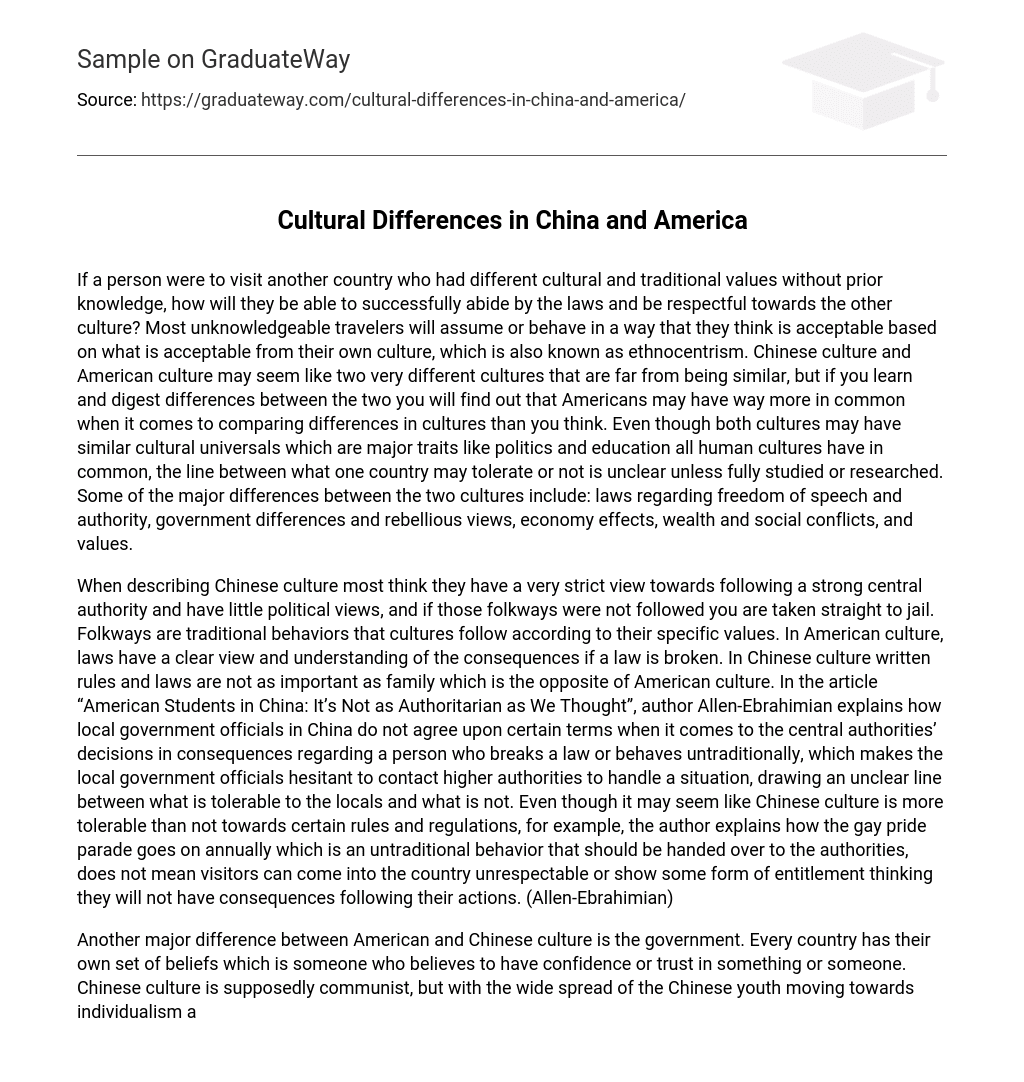If a person were to visit another country who had different cultural and traditional values without prior knowledge, how will they be able to successfully abide by the laws and be respectful towards the other culture? Most unknowledgeable travelers will assume or behave in a way that they think is acceptable based on what is acceptable from their own culture, which is also known as ethnocentrism. Chinese culture and American culture may seem like two very different cultures that are far from being similar, but if you learn and digest differences between the two you will find out that Americans may have way more in common when it comes to comparing differences in cultures than you think. Even though both cultures may have similar cultural universals which are major traits like politics and education all human cultures have in common, the line between what one country may tolerate or not is unclear unless fully studied or researched. Some of the major differences between the two cultures include: laws regarding freedom of speech and authority, government differences and rebellious views, economy effects, wealth and social conflicts, and values.
When describing Chinese culture most think they have a very strict view towards following a strong central authority and have little political views, and if those folkways were not followed you are taken straight to jail. Folkways are traditional behaviors that cultures follow according to their specific values. In American culture, laws have a clear view and understanding of the consequences if a law is broken. In Chinese culture written rules and laws are not as important as family which is the opposite of American culture. In the article “American Students in China: It’s Not as Authoritarian as We Thought”, author Allen-Ebrahimian explains how local government officials in China do not agree upon certain terms when it comes to the central authorities’ decisions in consequences regarding a person who breaks a law or behaves untraditionally, which makes the local government officials hesitant to contact higher authorities to handle a situation, drawing an unclear line between what is tolerable to the locals and what is not. Even though it may seem like Chinese culture is more tolerable than not towards certain rules and regulations, for example, the author explains how the gay pride parade goes on annually which is an untraditional behavior that should be handed over to the authorities, does not mean visitors can come into the country unrespectable or show some form of entitlement thinking they will not have consequences following their actions. (Allen-Ebrahimian)
Another major difference between American and Chinese culture is the government. Every country has their own set of beliefs which is someone who believes to have confidence or trust in something or someone. Chinese culture is supposedly communist, but with the wide spread of the Chinese youth moving towards individualism and a market-based economy where the production of goods is based off supply and demand, they are following a capitalism structured government. Rumors were spread that the youth of Chinese culture are rebellious for breaking away from tradition and wanting to become individualized instead of standing together as a group which was the more traditional approach. Lee comments in his article, “Debunking Myths About China’s Youth Culture,” how identity and individualism are the factors that shaped the social mores of the community, which in return means the Chinese youth culture is distinguishing between what’s right and what’s wrong, developing a society of their own. Exercising a different value system is not considered rebellious in any way according to Lee. The way in which the Chinese youth culture is breaking away from tradition and becoming self-motivated and individualized in their own ways promises a strong generation evolving. (Lee)
According to the article “China’s Government may be Communist, but its People Embrace Capitalism,” Katie Simmons further addresses the benefits of a free market economy leading to the differences in economic growth and development. Simmons provides a graph showing how China, Germany, The United States and The United Kingdom come to a global median of 64% agreeing on how a free market economy will be a positive impact on all Cultures. With China ranking the highest on the graph, they also reached a point where their economy has increased dramatically overall becoming the biggest economy in the world. Most of Chinese culture believes they are heading in the right direction with the economic growth, but some are becoming hesitant with the possible negative outcomes. Some of the negative outcomes China can face is inequality (rich and poor gap), corruption and inflation, as Simmons explains. The major differences between the two are that the American economy is freer, less regulated, less government involvement in the economy, a lot more diverse and dynamic, and has increased job opportunities. In comparison the Chinese economy is more centralized, less productive, and holds less job opportunities.
As I researched Chinese culture not many significant differences were found between the American culture and their own. There is much to be gained by observing how people of the same culture interact with each other and how others perceive or judge another culture before firsthand experience. Making a genuine effort to find the positive historical, literary, and cultural contributions of a society can have positive effects. My contention, then, is not that there are no cultural differences but the differences between cultures and peoples are real and can add richness to the fabric of life. My assertion is that people everywhere have much more in common then they think. When the exterior is peeled off, there are not so many differences after all.





